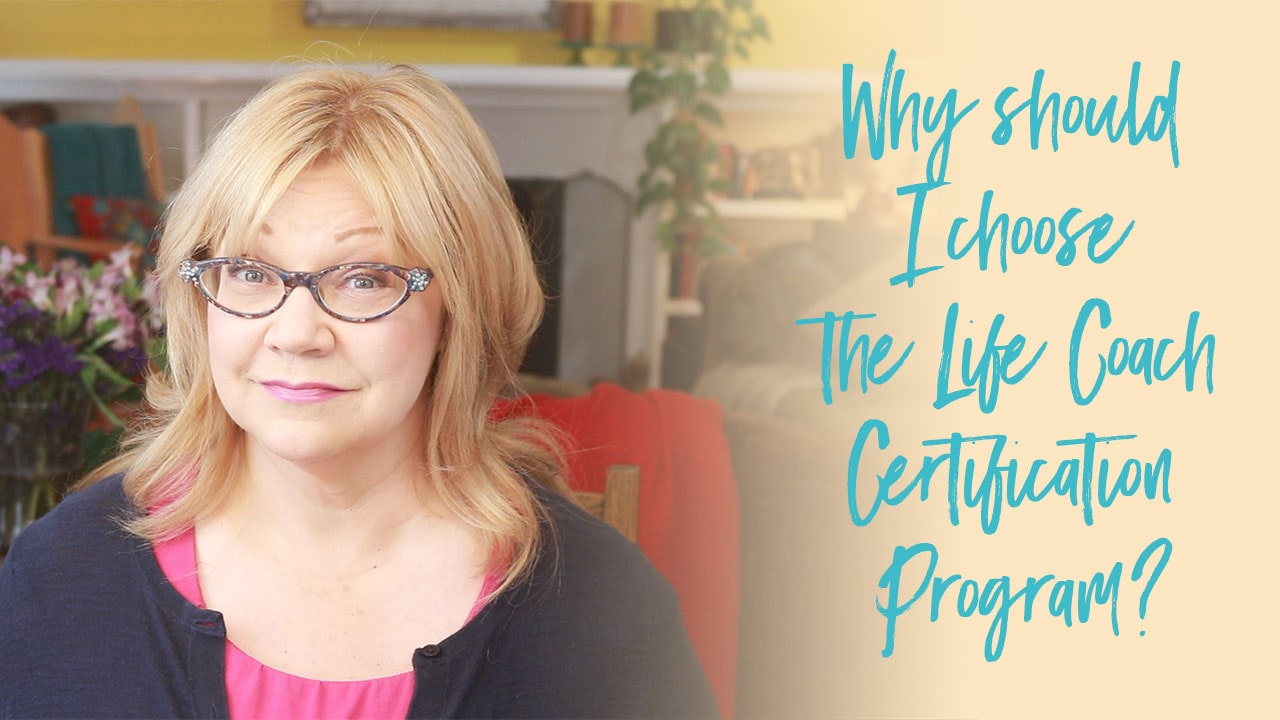What is mentorship, and do life coaches need it?
When Coaches ask me if they need mentorship for professional development, I always say ABSOLUTELY! Of course you need a good mentor to grow your coaching business! It’s one of the best ways to uplevel your coaching, build up your skills, and gain constructive feedback.
Unfortunately, the mentoring process still isn't popular in coaching curriculums. Though therapists need an average of 2,500 supervised hours to get their license, mentorship only plays a minor role in most coaching programs.
When I developed the Fearless Living Life Coaching Certification Program (LCCP), I made a promise to myself: mentorship would be an integral part of the program and everyone would receive it.

So, what is mentorship? In this article, I’ll answer that question, discuss how a good mentoring relationship works, and why all life coaches should seek mentors.
What Is Mentorship? How It's Different From Coaching
First, let's get one thing out of the way. A coaching mentor shouldn’t be the same person as your personal life coach. In a professional setting, a coaching mentor is someone who has a more advanced role and can share their experience in a way that supports your growth.
Mentoring experiences can help you progress faster in just about any field because mentoring enables you to gain wisdom from someone who has already achieved what you want to achieve. In the coaching world, this often means getting supervision from a Master Coach who can answer your questions and support you through confusing moments with your clients.
A healthy relationship between a mentee and mentor should have a few distinctive traits:
- Mentorship is based on mutual respect. Even though the mentor is more senior, they take the mentee seriously and don't look down on them.
- The mentorship provides opportunities for mutual learning. When an expert and beginner come together, they can both benefit from the mentoring relationship.
- The mentorship is constructive. A good mentor is someone who provides a balance of support and constructive feedback.
- The mentorship is focused. A mentor is dedicated to supporting you in becoming a more skilled and confident Coach.
If all of that sounds a bit like coaching, it's because the two aren't that far off. However, there are a few important differences between life coaching and mentorship.
- Depending on a client’s goals, coaching can be short-term or long-term. Mentorship is a long-term relationship focused on the mentee’s personal growth and career development.
- In coaching, it's often assumed that the Coach leads the way. In the mentoring process, it's up to the mentee to take initiative, asking questions and sharing their innermost thoughts.
- While great Coaches are not directive, mentors can give you feedback since they are devoted to supporting you in acquiring the coaching skills necessary to succeed.
Learn more about what a Life Coach does specifically in my article: What Is a Life Coach and What Do They Do?
Let’s dig deeper into why a supportive mentor is so important to becoming a Life Coach.
Why a Mentor Is Crucial to Your Professional Development as a Coach
One thing you should keep in mind as a beginner Coach is this:
You don't know what you don't know.
After you receive training as a Coach and learn the basics, you may fall for the trap of thinking you already know everything you need to. It’s a common phenomenon called the Dunning-Kruger effect. It means that in the early stages of the learning curve, people tend to overestimate how much they know. When they get more experience, they start realizing there's still much more to learn.
This is why I believe a mentor is essential to your development, especially over the course of your first 100 coaching hours—an experienced individual who's been where you are and can quickly point out both your strengths and weaknesses as a Coach. They can answer questions that you'd otherwise take months or even years to fully understand.
A good mentor will help you achieve your career goals faster. For example, if you record your coaching sessions and analyze them with your mentor (with your client’s expressed consent, of course!), you can gain valuable feedback on your coaching method from someone who's been doing it for years.
So, how do you know what to look for in a good mentor? And if you want to become a mentor, what traits are the ones to strive for?
Traits of a Good Mentors
To help you advance your coaching practice, it’s best if your mentor has at least a few years more coaching experience than you do. But effective mentoring isn't just about how senior the mentor is in relation to the mentee.
It’s also about the kind of person a Coach is. Your mentoring experience will depend on whether your mentor is passionate about the process and committed to helping you become the best that you can be.
1. Mentors Are Role Models
There's a popular saying: "Only take advice from people you'd trade places with." A mentor is someone you look up to and someone who inspires you—not just someone with a few more years of experience on the job.
They're more than an experienced Coach; in terms of their values, they're the kind of person you aspire to be. Effective mentoring depends on how a mentee relates to their mentor and how inspired they are by them.
2. Mentors Deliver Constructive Feedback
Folks, as you know, not everyone is willing to tell it like it is. Some people are too afraid to hurt your feelings by providing feedback that isn’t 100% positive—and these people don't make the best mentors.
Delivering feedback in a kind, compassionate manner is an art. Look for someone who knows how to be direct while maintaining mutual respect in the mentoring relationship. Your mentor must be able to be able to speak to you about your strengths and weaknesses constructively.
3. Mentors Are Good Listeners
There's much to be said about the value of active listening in every area of your life. But when you're getting mentored as a Life Coach, it's even more important.
Without active listening, the mentor can’t empathize with you and recognize how your path is different from theirs. Someone who isn’t really listening may tell you to follow their exact path instead of empowering you to find your own path.
How do you recognize if they're really listening? Here’s a trick. After you share something, pay close attention to whether they respond to what you said or just continue their monologue. It'll soon become clear if they're actually listening or just thinking of what they'll say next.
4. Mentors Share Their Knowledge and Experience
Effective mentoring depends on how eager your mentor is to share their knowledge. Some people are more generous than others in this respect.
If your mentor is guarding a part of their knowledge for fear you might use it to compete with them, that's not a good sign. Look for someone who's secure enough to share what they know. This won't just help you pick their brain, it'll also signal you're dealing with an emotionally mature person.
How to Find Your Mentor
Finding the right mentor is where most people get stuck, which is understandable. After all, how are you supposed to find the exact right person? Someone you get along with who can also help you with your career goals?
To be honest, establishing a good mentoring relationship often requires a lot of trial and error. There will be people you click with, and people who you just don’t connect with. It’s unlikely that a mentor is going to find their way to you. Put in the time to get to know people, seek new connections, and network within the coaching community.
An alternative to formal mentoring relationships is peer-mentoring. However, I see the most benefits when a mentor has more experience than you, as opposed to someone at your level. In fact, peer mentoring is more like getting advice from a friend rather than a seasoned professional.
You don’t have to be a beginner coach to benefit from mentorship. If you’re ever at a crossroads in your practice or keep encountering the same issues as a coach, you can search your professional network for experienced individuals you can learn from.
There’s one answer that’s a lot more simple than searching for a mentor on your own. Choosing a coaching certification that features a mentoring program as part of the curriculum can save you a lot of time and get you matched with a passionate mentor right away.
Find Your Coaching Mentor at LCCP

The Life Coaching Certification Program at the Fearless Living Institute is exactly that. While few other programs offer mentorship within their training (and it's usually not more than three hours), I made it a point to place mentoring at the forefront of our coaching education.
In LCCP, we include 75 hours of supervised coaching with real clients. That's more than 25x the nearest certification program offers. All those supervised hours are included in the tuition because I believe mentorship is a crucial component of the coaching path.
Our mentors will help you:
- Identify where you can improve as a Coach
- Acknowledge the natural strengths of your coaching and learning style
- Help you get unstuck when you don't know how to deal with a client
- Ask thought-provoking questions to raise your self-awareness as a Coach
- Be your greatest advocate while you grow your confidence
Of course, LCCP offers much more than mentorship. If you're wondering whether this is the right program for you, take this short quiz to help you decide.
What is mentorship, and do life coaches need it?
When Coaches ask me if they need mentorship for professional development, I always say ABSOLUTELY! Of course you need a good mentor to grow your coaching business! It’s one of the best ways to uplevel your coaching, build up your skills, and gain constructive feedback.
Unfortunately, the mentoring process still isn't popular in coaching curriculums. Though therapists need an average of 2,500 supervised hours to get their license, mentorship only plays a minor role in most coaching programs.
When I developed the Fearless Living Life Coaching Certification Program (LCCP), I made a promise to myself: mentorship would be an integral part of the program and everyone would receive it.

So, what is mentorship? In this article, I’ll answer that question, discuss how a good mentoring relationship works, and why all life coaches should seek mentors.
What Is Mentorship? How It's Different From Coaching
First, let's get one thing out of the way. A coaching mentor shouldn’t be the same person as your personal life coach. In a professional setting, a coaching mentor is someone who has a more advanced role and can share their experience in a way that supports your growth.
Mentoring experiences can help you progress faster in just about any field because mentoring enables you to gain wisdom from someone who has already achieved what you want to achieve. In the coaching world, this often means getting supervision from a Master Coach who can answer your questions and support you through confusing moments with your clients.
A healthy relationship between a mentee and mentor should have a few distinctive traits:
- Mentorship is based on mutual respect. Even though the mentor is more senior, they take the mentee seriously and don't look down on them.
- The mentorship provides opportunities for mutual learning. When an expert and beginner come together, they can both benefit from the mentoring relationship.
- The mentorship is constructive. A good mentor is someone who provides a balance of support and constructive feedback.
- The mentorship is focused. A mentor is dedicated to supporting you in becoming a more skilled and confident Coach.
If all of that sounds a bit like coaching, it's because the two aren't that far off. However, there are a few important differences between life coaching and mentorship.
- Depending on a client’s goals, coaching can be short-term or long-term. Mentorship is a long-term relationship focused on the mentee’s personal growth and career development.
- In coaching, it's often assumed that the Coach leads the way. In the mentoring process, it's up to the mentee to take initiative, asking questions and sharing their innermost thoughts.
- While great Coaches are not directive, mentors can give you feedback since they are devoted to supporting you in acquiring the coaching skills necessary to succeed.
Learn more about what a Life Coach does specifically in my article: What Is a Life Coach and What Do They Do?
Let’s dig deeper into why a supportive mentor is so important to becoming a Life Coach.
Why a Mentor Is Crucial to Your Professional Development as a Coach
One thing you should keep in mind as a beginner Coach is this:
You don't know what you don't know.
After you receive training as a Coach and learn the basics, you may fall for the trap of thinking you already know everything you need to. It’s a common phenomenon called the Dunning-Kruger effect. It means that in the early stages of the learning curve, people tend to overestimate how much they know. When they get more experience, they start realizing there's still much more to learn.
This is why I believe a mentor is essential to your development, especially over the course of your first 100 coaching hours—an experienced individual who's been where you are and can quickly point out both your strengths and weaknesses as a Coach. They can answer questions that you'd otherwise take months or even years to fully understand.
A good mentor will help you achieve your career goals faster. For example, if you record your coaching sessions and analyze them with your mentor (with your client’s expressed consent, of course!), you can gain valuable feedback on your coaching method from someone who's been doing it for years.
So, how do you know what to look for in a good mentor? And if you want to become a mentor, what traits are the ones to strive for?
Traits of a Good Mentors
To help you advance your coaching practice, it’s best if your mentor has at least a few years more coaching experience than you do. But effective mentoring isn't just about how senior the mentor is in relation to the mentee.
It’s also about the kind of person a Coach is. Your mentoring experience will depend on whether your mentor is passionate about the process and committed to helping you become the best that you can be.
1. Mentors Are Role Models
There's a popular saying: "Only take advice from people you'd trade places with." A mentor is someone you look up to and someone who inspires you—not just someone with a few more years of experience on the job.
They're more than an experienced Coach; in terms of their values, they're the kind of person you aspire to be. Effective mentoring depends on how a mentee relates to their mentor and how inspired they are by them.
2. Mentors Deliver Constructive Feedback
Folks, as you know, not everyone is willing to tell it like it is. Some people are too afraid to hurt your feelings by providing feedback that isn’t 100% positive—and these people don't make the best mentors.
Delivering feedback in a kind, compassionate manner is an art. Look for someone who knows how to be direct while maintaining mutual respect in the mentoring relationship. Your mentor must be able to be able to speak to you about your strengths and weaknesses constructively.
3. Mentors Are Good Listeners
There's much to be said about the value of active listening in every area of your life. But when you're getting mentored as a Life Coach, it's even more important.
Without active listening, the mentor can’t empathize with you and recognize how your path is different from theirs. Someone who isn’t really listening may tell you to follow their exact path instead of empowering you to find your own path.
How do you recognize if they're really listening? Here’s a trick. After you share something, pay close attention to whether they respond to what you said or just continue their monologue. It'll soon become clear if they're actually listening or just thinking of what they'll say next.
4. Mentors Share Their Knowledge and Experience
Effective mentoring depends on how eager your mentor is to share their knowledge. Some people are more generous than others in this respect.
If your mentor is guarding a part of their knowledge for fear you might use it to compete with them, that's not a good sign. Look for someone who's secure enough to share what they know. This won't just help you pick their brain, it'll also signal you're dealing with an emotionally mature person.
How to Find Your Mentor
Finding the right mentor is where most people get stuck, which is understandable. After all, how are you supposed to find the exact right person? Someone you get along with who can also help you with your career goals?
To be honest, establishing a good mentoring relationship often requires a lot of trial and error. There will be people you click with, and people who you just don’t connect with. It’s unlikely that a mentor is going to find their way to you. Put in the time to get to know people, seek new connections, and network within the coaching community.
An alternative to formal mentoring relationships is peer-mentoring. However, I see the most benefits when a mentor has more experience than you, as opposed to someone at your level. In fact, peer mentoring is more like getting advice from a friend rather than a seasoned professional.
You don’t have to be a beginner coach to benefit from mentorship. If you’re ever at a crossroads in your practice or keep encountering the same issues as a coach, you can search your professional network for experienced individuals you can learn from.
There’s one answer that’s a lot more simple than searching for a mentor on your own. Choosing a coaching certification that features a mentoring program as part of the curriculum can save you a lot of time and get you matched with a passionate mentor right away.
Find Your Coaching Mentor at LCCP

The Life Coaching Certification Program at the Fearless Living Institute is exactly that. While few other programs offer mentorship within their training (and it's usually not more than three hours), I made it a point to place mentoring at the forefront of our coaching education.
In LCCP, we include 75 hours of supervised coaching with real clients. That's more than 25x the nearest certification program offers. All those supervised hours are included in the tuition because I believe mentorship is a crucial component of the coaching path.
Our mentors will help you:
- Identify where you can improve as a Coach
- Acknowledge the natural strengths of your coaching and learning style
- Help you get unstuck when you don't know how to deal with a client
- Ask thought-provoking questions to raise your self-awareness as a Coach
- Be your greatest advocate while you grow your confidence
Of course, LCCP offers much more than mentorship. If you're wondering whether this is the right program for you, take this short quiz to help you decide.








